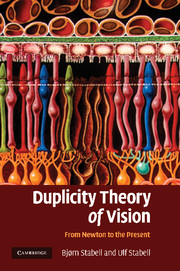Book contents
- Frontmatter
- Contents
- Acknowledgements
- 1 Introduction
- Part I The development of the basic ideas of the duplicity theory from Newton to G. E. Müller
- Part II The development of the duplicity theory from 1930–1966
- Part III Chromatic rod vision: a historical account
- Part IV Theories of sensitivity regulation of the rod and cone systems: a historical account
- Part V Factors that triggered the paradigm shifts in the development of the duplicity theory
- References
- Index
Part II - The development of the duplicity theory from 1930–1966
Published online by Cambridge University Press: 22 January 2010
- Frontmatter
- Contents
- Acknowledgements
- 1 Introduction
- Part I The development of the basic ideas of the duplicity theory from Newton to G. E. Müller
- Part II The development of the duplicity theory from 1930–1966
- Part III Chromatic rod vision: a historical account
- Part IV Theories of sensitivity regulation of the rod and cone systems: a historical account
- Part V Factors that triggered the paradigm shifts in the development of the duplicity theory
- References
- Index
Summary
In this developmental period, profound new knowledge about the anatomical and neurophysiological properties of the retina emerged as a result of advances in sophisticated instrumentation and research techniques. This knowledge greatly influenced the development of the duplicity theory: it provided an insight into the rod and cone processes, and also created and paved the way for new ideas of rod and cone functioning. Outstanding contributions to the development were provided by Polyak, Hartline, Kuffler and Granit. Using the Golgi impregnation method, Polyak's investigation of the primate retina helped to elucidate the extremely complex structure of the many types of retinal cells and the character of their connections. Hartline, Kuffler and Granit, using microelectrodes for registration of the action potential from individual nerve fibres in response to illumination, increased our knowledge about the relationship between light stimuli and nerve impulses in the retina.
Information
- Type
- Chapter
- Information
- Duplicity Theory of VisionFrom Newton to the Present, pp. 61Publisher: Cambridge University PressPrint publication year: 2009
